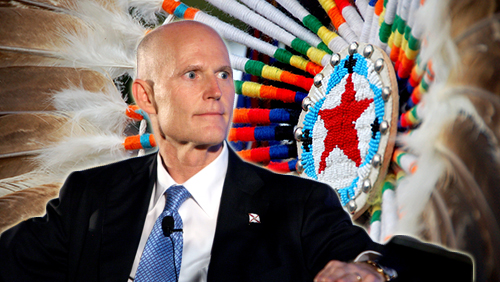It was a rough outing at the Florida Senate for Gov. Rick Scott’s proposal for a $3 billion gambling compact with the Seminole Tribe.
 On Wednesday, the governor’s policy guru was verbally beaten by senators over the terms of the proposed wide-ranging deal, particularly with question on its possible impact on the state’s pari-mutuel facilities, the Palm Beach Post reported.
On Wednesday, the governor’s policy guru was verbally beaten by senators over the terms of the proposed wide-ranging deal, particularly with question on its possible impact on the state’s pari-mutuel facilities, the Palm Beach Post reported.
In December Scott announced that he had reached a new gambling deal with the Seminole Tribe of Florida that will bring $3.1 billion revenue guarantee for the state over a period of seven years. The deal will preserve the tribe’s right to offer blackjack and other house-banked card games at all of its casinos, two more than those covered under the previous compact that expired in July.
The new deal will allow two new slots licenses: one at the Palm Beach Kennel Club, and another reserved for the still unknown venue in Miami-Dade County.
Sen. Jack Latvala (R-Clearwater) said “that doesn’t make sense,” since voters from five other counties have already approved slot machines at local pari-mutuel sites, but they came up empty in the proposal.
Miami senators Gwen Margolis and Anitere Flores, on the other hand, said they already have four tracks in their county and they aren’t looking forward to adding one more.
“Who asked for it? Certainly Dade County didn’t ask for it,” Margolis said, according to the Post.
Latvala also wanted to know whether much of the new revenue wouldn’t be taken by Scott’s $1 billion tax cut plan. According to Scott’s policy director Jeff Woodburn, who acted as point man during the Senate hearing, it’s up to lawmakers “however you want to allocate” the money, Saint Peters Blog reported. What the governor’s policy guru failed to mention was that Scott has a line-item veto power over the state budget.
Previously, Scott wrote a love letter to legislative letters on the perks of the new gambling compact, saying it represented “an unprecedented level of cooperation” between the state and tribe, creating a “stable and predictable gaming environment” for the state budget, not to mention a revenue guarantee that’s three times larger than the deal signed in 2010 and $1 billion more than the tribe had offered to pay in 2014.





